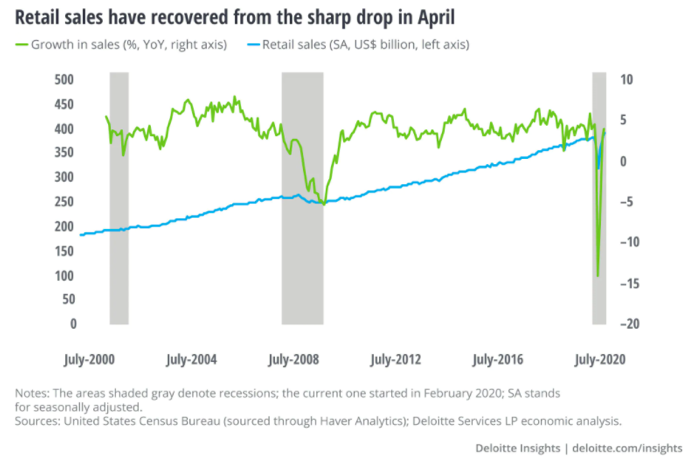The retail industry was already under siege by e-commerce, a trend threatening both small mom-and-pop shops and large mall owners alike. Since COVID-19 entered the fray, retailers have been struggling even more, though some are faring better than others. Which retailers are struggling and which have been able to take advantage of a terrible situation?
Understandably, retail sales plummeted when the pandemic first took hold in the US. According to Deloitte sales fell more from February to April 2020 (14.3%) than in any other period during the previous two recessions. Spending also decreased across the board, especially in low-income households. Panicked consumers rushed to bulk buy groceries, pharmacy items, and toilet paper when it looked like there would be shortages. Cleaning items like hand sanitizers, cleaning wipes, and aerosol disinfectants saw their sales increase by more than 100% in the first three months alone as people tried to keep COVID-19 out of their homes. With hair salons and local breakfast spots closed, hair color products and coffee sales climbed. But, because offices closed and vacations had to be canceled, sales of cosmetics and sun care products saw double-digit declines by 25%.
Since April, the levels have been slowly returning. June spending reached pre-pandemic February levels and July surpassed that by 1.2% quarter-over-quarter. McKinsey found that as of August 2020, consumers were still focused on essential spending (like groceries) but “discretionary” spending, while still negative, was slowly recovering as well. The firm also reported that Americans are still not likely to spend money on “out-of-home activities” but, if they do go shopping, they are more likely to shop in a store if it actively promotes health initiatives like wearing a mask.
The majority of Americans, however, are shopping online to avoid buying in person and lessen the potential of contracting the virus. E-commerce climbed 32% in Q2, according to the U.S. Census Bureau, and accounted for 16% of all U.S. sales after consumers spent $211.5 billion online. McKinsey found that because so many had turned to e-commerce, 77% of Americans tried new brands, diminishing some previously unshakeable brand loyalty.
On the whole, Deloitte is reporting a shift in spending from services to products due to health concerns. Non-store retailers (i.e. those that sell their products online) saw a 21.9% growth in their sales between February and July 2020 according to Deloitte. Sporting goods, book, and music stores, as well as food and beverage stores, saw similar success at 17.6% and 11.5% growth rates respectively. In contrast, Deloitte found that restaurants and bars, and clothing shops saw their sales plunge by 19.7% and 19.9% respectively. Because so many people have lost their jobs, many are cutting down on “nonessential” spending.
Retail sales are returning but not evenly. Retailers which are reliant on in-person or nonessential spending have continued to see major losses in their profits throughout the pandemic. Consumers have shifted their spending habits from in-person to online and have decreased purchasing of nonessentials and services due to the pandemic. Central to all of these trends is COVID and the fear of being infected which has shifted ingrained buying patterns. Depending on when a vaccine is made public, hurting retail subsectors like restaurants may still be able to bounce back, though many current trends, like the increased reliability on e-commerce, may be cemented for years to come.
About AKCEL Partners
The AKCEL Partners sales consultant firm was founded by three executives with strong bonds throughout many branded and retail categories. AKCEL Partners offers a unique business proposition from other sales consultant firms. The AKCEL sales consultant firm tailors its account team and market plans specifically to each client’s needs. Unlike other sales consultant firms, AKCEL Partners acquires sales consultant talent to fit each job, securing experienced professionals who can get immediate access to decision makers at the highest levels. To learn more, go to www.AKCELPartners.com.


